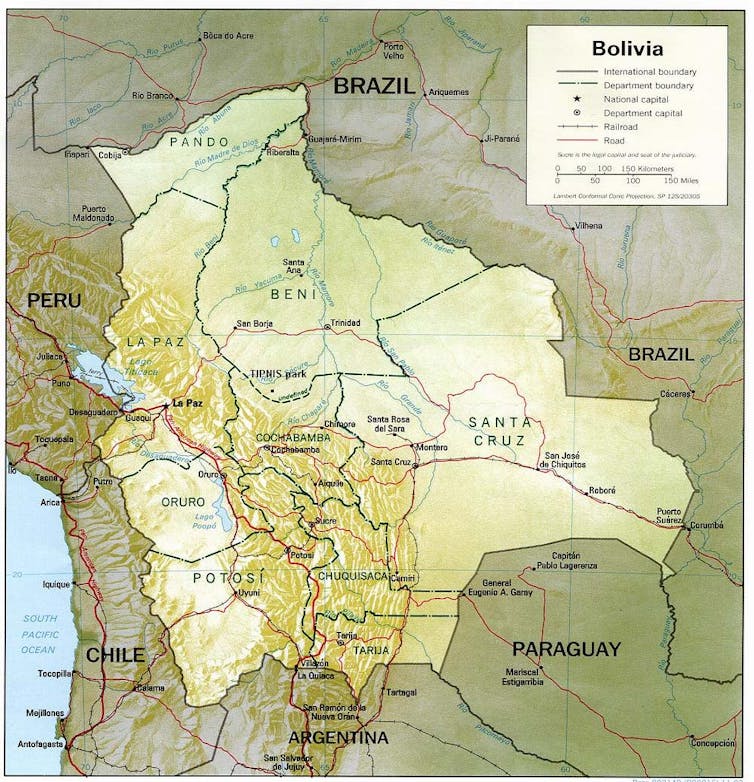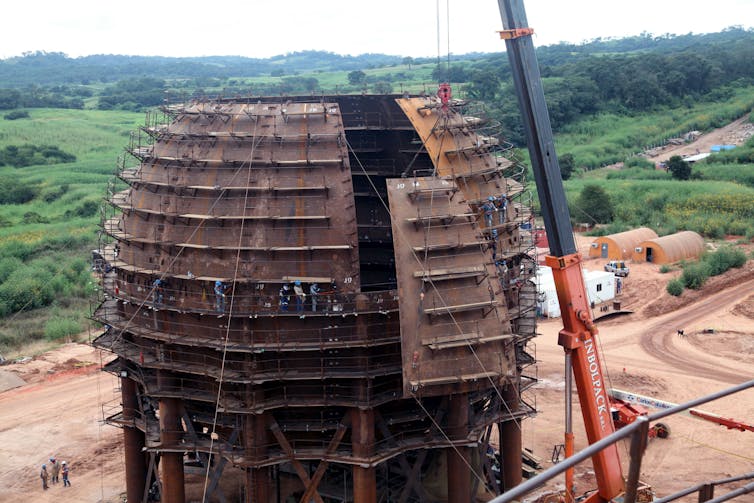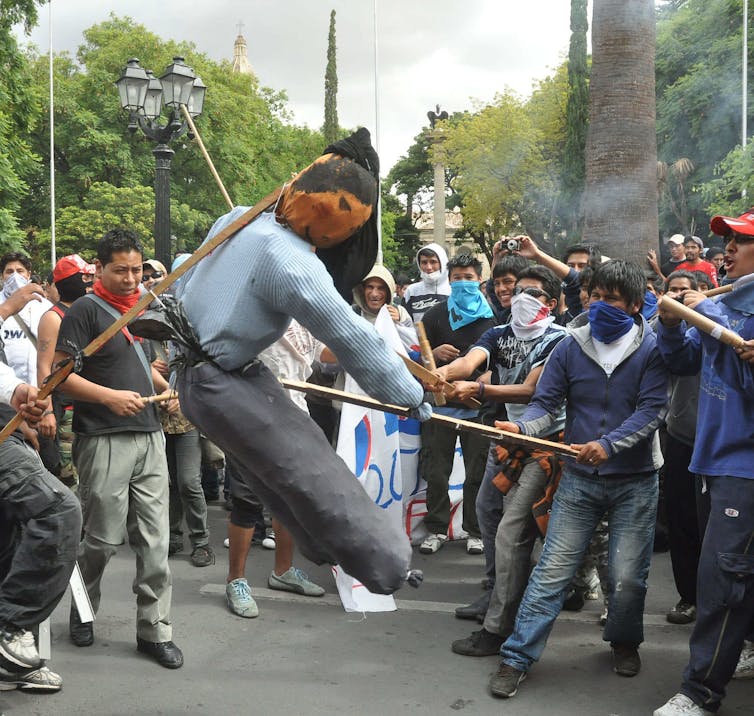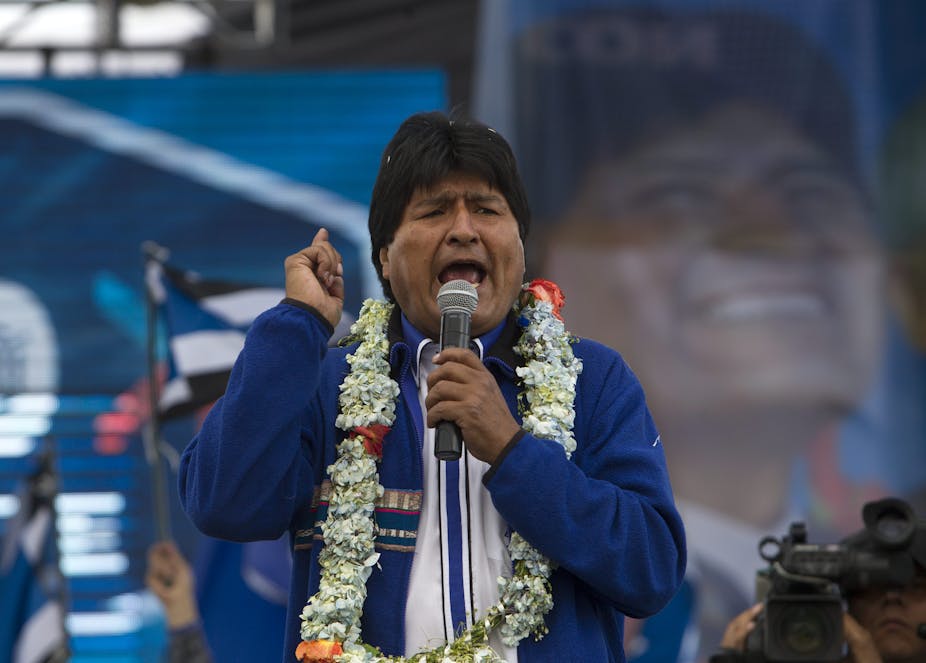Evo Morales appears poised to win a third term as president of Bolivia in an election on October 12 at the helm of his “Movement Towards Socialism” (MAS) party. Yet he remains a controversial figure both inside and outside the country.
His close relationship with Hugo Chavez and Fidel Castro set him up for criticism as a radical leftist right from the beginning of his presidency in 2006. His anti-imperialist rhetoric might have been popular at home, but it has been hard for the US to swallow. On the other hand he has received significant criticism in Bolivia for perceptions that he is unfairly manipulating electoral courts. Yet he remains broadly popular in many sectors of the population. Even the IMF has acknowledged that he has managed the economy prudently and effectively, spurring growth and managing inflation.
The court of public opinion
At the moment I am carrying out ethnographic field work in Beni department, the province in the eastern lowlands that is often held up as a centre of resistance. Some indigenous groups feel that Morales has failed to follow through on his promises to guarantee them greater autonomy in their territories.
The 2010 protests over the construction of a road through the indigenous territory in the TIPNIS national park sparked a series of marches and police repression that presented a serious challenge for Morales’ government, as it pitched indigenous opponents into an awkward alliance with landed elites, whose opposition to Morales is often phrased in overtly racist terms. They have succeeded in having the road postponed, but only until next year.

On the other hand, many of the people I have been working with plan to vote for Morales. The government’s vast spending on infrastructure projects, flood relief and social welfare programmes in the region appears to be paying off in terms of gaining support for the MAS.
Such banal political manoeuvrings make for boring news, but they do a much better job of accounting for Morales’ popularity than the more fantastic theories that some in the US have floated. Some US reports have noted as many as 1,000 practising Muslims in Bolivia (probably an over-estimate) and conclude that the country is “becoming a hotbed of Islamic extremism”.
It is easy to dismiss this rhetoric as hyperbolic nonsense or old-fashioned racism, but pressing the idea that Bolivia is incapable of governing itself has more traction that you might think. When a colleague at a US military university found out I worked in Bolivia, his first reaction was to exclaim that it is in terrible shape. In Latin America – with its long history of US complicity in campaigns to overthrow governments from Guatemala and Chile to Venezuela – such a remark from a US official would hardly pass as idle chatter. One of the most effective tools in these campaigns has been influencing the court of international public opinion, which is sometimes used to legitimise aggressive interventions.
There have not yet been any coup attempts in Bolivia, but the persistent image of Evo Morales as a radical indigenous leftist has serious implications nonetheless. How many heads of sovereign states have been stopped and had their presidential jet searched without international incident?
Energy the bottom line
I suspect that energy goes to the heart of the US’s concerns over Bolivia. Throughout the campaign, Morales has been inaugurating natural gas facilities and championing Bolivia’s plans to export electric energy to its neighbours. He has campaigned on the message that “whoever has control over energy has political power”.

Indeed, energy politics have always been central to Morales’ plans for the country. He was elected after protests over his predecessors’ plans to export the country’s vast natural gas reserves via Chile in a deal that was seen as far more favourable to Western petroleum companies than to the Bolivian people. He acted quickly to bring these resources under stricter national control, generating significantly higher revenues.
Gasolinazo
The most significant threat to Morales’ presidency was also related to energy. This was in the wake of the “gasolinazo”, the government’s decision on December 26, 2010 to cancel fuel subsidies, which massively increased the cost of fuel. This was seen as the very kind of neo-liberal reform that Morales had generally opposed. Hundreds of thousands across the country took to the streets and blockaded roads, demanding his resignation.

By New Year’s Day, Morales had reversed course. Soon afterwards he plastered the capital, La Paz, with billboards with his photo, and a caption that read “mandar obedeciendo” (“leading by following”). This representation is surprisingly accurate and reflects a major reason for his popularity.
Morales is far from perfect. He has failed to deliver on many of his promises to indigenous peoples. He plays political hardball in ways that push the boundaries of decency, not least in his controversial decision last year to change the constitution to allow himself a third term.
But he also promotes the interests of wide sectors of the population – at least as they see them – whether through infrastructure construction or natural resource policies that support a centralised welfare state. When the likes of Norway, or for that matter nearly half of the Scottish population, vote to use energy revenues to fund social welfare states, we recognise it as the rational decision of a competent political body. If and when Bolivia does the same, why should anyone judge it differently?

